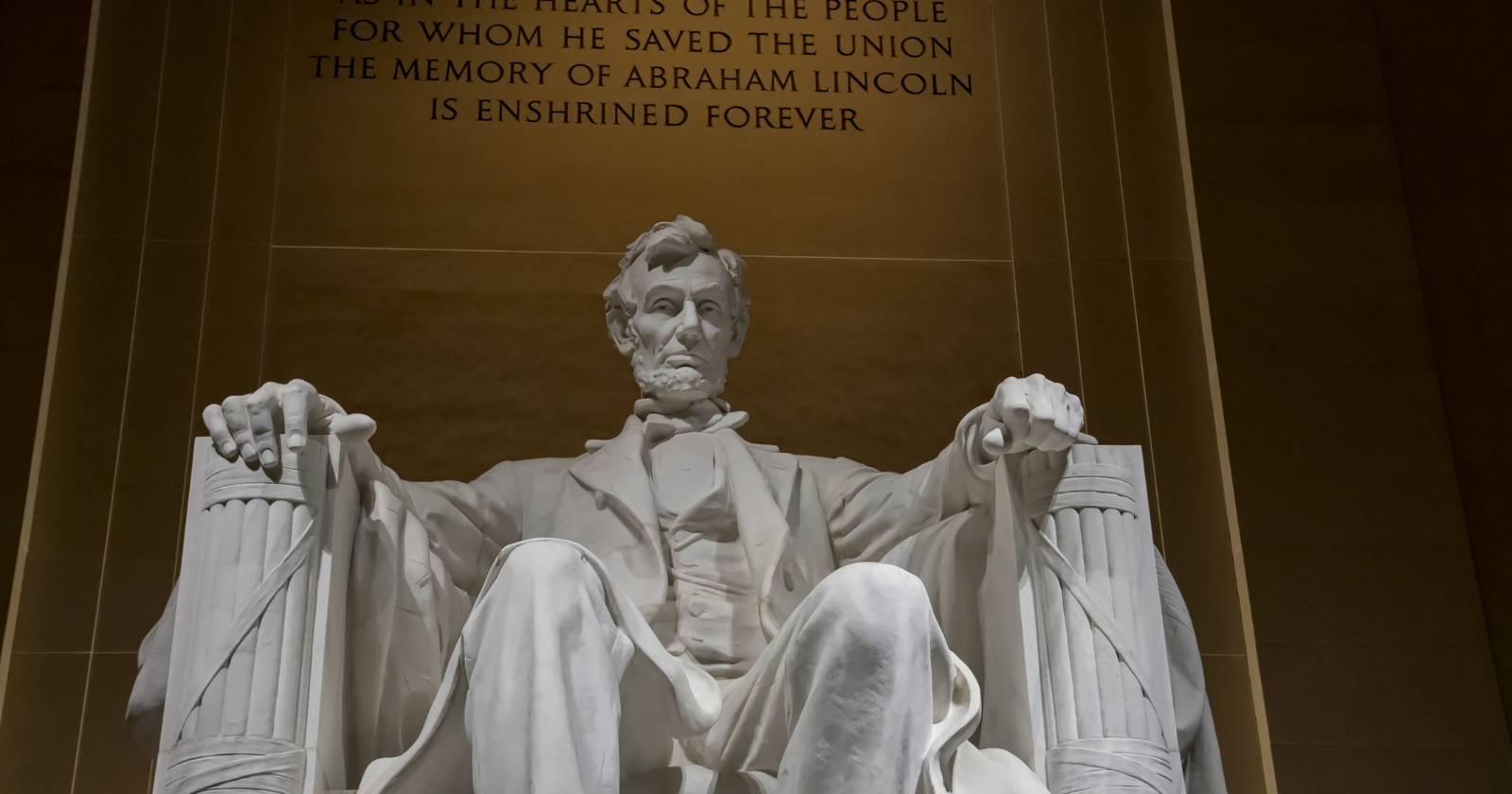“Government of the people, by the people, for the people, shall not perish from the Earth.”
– Gettysburg Address [Abraham Lincoln, 1863]
Two of the greatest speeches in American history were made by President Abraham Lincoln during the Civil War from 1861 to 1865.
These speeches resonate with profound contributions to the American identity even today, underscoring an ongoing journey toward realizing liberty and equality for all.
In this article, we’ll delve into the profound impact of both these speeches.
We’ll unpack the main ideas that Lincoln conveyed — the vision of a united nation, the moral underpinnings of the Civil War, and the enduring quest for equality.
Lincoln’s vision of America
Imagine a nation, deeply divided, yearning for a beacon of hope.
This was the America Lincoln addressed.
He saw beyond the Civil War’s devastation, envisioning a united country grounded in the principles of liberty and equality.
Lincoln didn’t just see America as it was. He dreamed of what it could become.
His vision?
A nation “under God,” with a “new birth of freedom,” where the government “of the people, by the people, for the people” thrives.
Through his words, Lincoln invited every American to share in this dream, to contribute to a collective journey toward a more perfect union.
The Gettysburg Address
During America’s bloodiest conflict, Abraham Lincoln delivered the Gettysburg Address — a speech that would become etched in the annals of history.
On November 19, 1863, he stood on the battlefield where thousands had fallen, not just to honor those who had given their lives, but to redefine the purpose of the Civil War itself.
Lincoln reminded us that the nation was founded on the principle that all men are created equal, and this war was a test of that very ideal.
He proclaimed the need for a “new birth of freedom,” ensuring that democracy—government of the people, by the people, for the people—would not vanish.
Lincoln’s words transformed Gettysburg from a place of sorrow into a symbol of national purpose.
This, in turn, urged the living to dedicate themselves to completing the unfinished work of those who fought and to ensure their sacrifice was not in vain.
Second Inaugural Address
In his Second Inaugural Address on March 4, 1865, Abraham Lincoln delivered a speech steeped in theological reflection, amidst the closing chapters of the Civil War.
Rather than a detailed plan for the nation’s future, Lincoln offered a meditation on the war’s divine significance.
He portrayed the conflict as a divine judgment on both North and South for the sin of slavery, suggesting that the war’s duration and bloodshed were determined by God’s will to eradicate the nation’s moral failings.
Yet, Lincoln’s focus was on reconciliation, not retribution.
He recognized the shared guilt in the sin of slavery and called for healing with “malice toward none” and “charity for all.”
In essence, Lincoln’s plea for unity and forgiveness laid the groundwork for rebuilding a divided nation, emphasizing justice and a lasting peace among all.
Main ideas of the Gettysburg Address
1) A new birth of freedom
The Gettysburg Address, delivered in the aftermath of a bloody and decisive battle during the Civil War, is not just a tribute to the fallen soldiers.
We can think of it as a redefinition of the American experiment.
Lincoln eloquently shifts the narrative from a mere struggle for national survival to a crusade for universal freedom and equality.
He declared that the war was a test of whether a nation “conceived in Liberty, and dedicated to the proposition that all men are created equal,” could endure.
This pivotal moment marked a shift in the national consciousness, redefining the purpose of the Civil War from a conflict over union to a fight for universal freedom.
This speech, short yet immensely powerful, underscored the war’s purpose:
To ensure that democracy would not just survive but thrive, ensuring “government of the people, by the people, for the people shall not perish from the earth.”
2) National unity
President Abraham Lincoln’s Gettysburg Address not only commemorated the harrowing battle but also highlighted the profound sacrifices made by soldiers from both the North and South.
In dedicating the Gettysburg National Cemetery, Lincoln extended the significance of the battle beyond a mere military victory to a testament to national unity and moral resolve.
He eloquently transformed the site into hallowed ground, emphasizing that the valor of those who fought and died there transcended any words of commemoration.
“The brave men, living and dead, who struggled here, have consecrated it, far above our poor power to add or detract,” Lincoln remarked.
This speech served as a poignant reminder that the ultimate goal of their sacrifice was not just for the preservation of the Union but for the promise of a truly unified nation, reborn with freedom and equality at its core.
3) Sacrifice of soldiers
Have you ever thought about the essence of true patriotism?
Well, Abraham Lincoln certainly did when he honored the soldiers who fought at Gettysburg.
He saw their sacrifice as the ultimate act of patriotism, not just because they fought for their country, but because they fought for the ideals it stands for: liberty, equality, and democracy.
Their dedication to these principles helped to redefine the nation’s identity, ensuring that the government “of the people, by the people, for the people, shall not perish from the earth.”
Lincoln’s words remind us that the true measure of devotion to our country lies in our willingness to support and protect these ideals, even at great personal cost.
It’s a powerful call to action for all of us to contribute to the unfinished work of those brave souls, to ensure their sacrifices were not in vain.
4) Government of, by, and for the people
Abraham Lincoln believed that the ultimate power rests not in a single ruler or select few but in the hands of every citizen.
Lincoln’s words at Gettysburg weren’t just rhetoric — they were a call to action.
They urge us to participate, to engage, and to take responsibility for the democracy we inherit.
Whether it’s voting, volunteering, or voicing our opinions, we’re reminded that our government thrives on our active involvement.
So, think about it: our democracy is a living, breathing entity that grows with our participation.
Let’s honor Lincoln’s vision by being active participants in our democracy, ensuring it remains of the people, by the people, and for the people. It’s in our hands to keep this dream alive for generations to come.
Main ideas of the Second Inaugural Address
1) Unity under God
Lincoln’s Second Inaugural Address casts a vision of a nation profoundly bonded by a common faith, despite being torn apart by civil war.
He remarked on the unique situation where adversaries, North and South, both prayed to the same God and sought divine favor for their cause.
This insight by Lincoln does more than highlight the ironies of war — it underscores a deeper unity under God that could serve as a foundation for reconciliation.
Amid division, Lincoln saw an unbreakable spiritual unity that transcended the battle lines.
His appeal to this shared faith was a plea for peace and understanding, aiming to bridge the chasm torn open by years of conflict.
That’s why you can perceive it as a powerful reminder that, at our core, there exists a commonality that can help heal the deepest of divisions.
2) Divine judgment on slavery
“Let us judge not, that we be not judged.”
In his Second Inaugural Address, Lincoln echoed Matthew 7:1, offering a profound reflection on the Civil War as divine judgment for the sin of slavery.
In particular, he suggested that both sides, North and South, were complicit and that the war was a divine instrument for purging this sin.
Yet, Lincoln’s invocation of this Scripture also called for an attitude of humility and forgiveness.
In simple terms, he was saying: We’ve all made mistakes — let’s not point fingers but work towards reconciliation with humility.
3) The moral complexity of the war
In the concluding part of his Second Inaugural Address, President Abraham Lincoln shifted his focus towards reconciliation and the healing of a nation torn apart by civil war.
With a tone of magnanimity, he appealed to his fellow Americans:
“With malice toward none, with charity for all … let us strive on to finish the work we are in, to bind up the nation’s wounds.”
First of all, these words sought to mend the deep divisions between the North and South. Besides, they laid the groundwork for the difficult process of Reconstruction that lay ahead.
Let’s be honest, we all know that Lincoln envisioned an America where former enemies could live together in peace and mutual respect, right?
By anchoring his appeal in Christian values of charity and forgiveness, Lincoln offered a path forward that prioritized unity and healing.
As a result, he set a high moral standard for the reunification of the country.
4) A call for national humility
In his profound address, Lincoln didn’t just seek to assign blame or declare victory. Instead, he extended a call for national humility.
He urged the nation to adopt a posture of humility in the face of divine judgment, recognizing that both sides of the conflict had contributed to the national sin of slavery.
Perhaps not surprisingly, this call was revolutionary, pushing for a collective acknowledgment of faults and a unified step toward healing.
Think about it:
Amidst the bitterness of war, Lincoln dared to suggest that the nation’s suffering might be a consequence of its own actions, a divine retribution for the years of enslavement it had inflicted.
He used the war as an example — a stark reminder of the cost of injustice and the need for a humble approach to rectify past wrongs.
Final thoughts: Legacy of Lincoln’s words
As you can see, the impact of Lincoln’s Gettysburg and Second Inaugural addresses extends far beyond their immediate historical context.
They have become foundational texts in American political and cultural identity, shaping how generations understand democracy, freedom, and equality.
Through these speeches, Lincoln did not merely address the issues of his time.
He offered a vision for America’s future:
A vision that still challenges us to fulfill the promise of “a new birth of freedom” and to work tirelessly towards “a just and lasting peace among ourselves and with all nations.”








